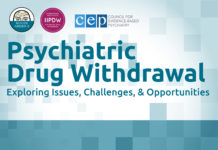On Tuesday 25th September, The Times published a front-page article entitled: “Drugs adviser David Baldwin quits after being branded ‘worse than Hitler’ in online abuse row.”
The article, by Health Editor Chris Smyth, reported that Psychiatrist Professor David Baldwin had resigned from a position on Public Health England’s review of Prescribed Drug Dependence, and blames personal abuse on social media.
The background to the story dates back to a meta-analysis of antidepressant efficacy and tolerability published in The Lancet in February 2018. Following professional criticism of that study, particularly that antidepressant withdrawal was not mentioned, Professor Baldwin, representing the Royal College of Psychiatrists, wrote to The Times, with the College’s President, Professor Wendy Burn, stating:
“In the vast majority of patients, any unpleasant symptoms experienced on discontinuing antidepressants have resolved within two weeks of stopping treatment.”
This statement upset and dismayed many people who found themselves struggling to withdraw over months and sometimes years. It also resulted in a group of thirty academics, psychiatrists and people with experience of withdrawing from antidepressants, writing to the Royal College of Psychiatrists, to request they retract their claim in The Times or provide research evidence for it. They have done neither.
More recently, it became clear that Professor David Baldwin was to be an expert adviser on a Government-led review into Prescribed Drug Dependence. The group of thirty again wrote to The Royal College of Psychiatrists, pointing out the fact that David Baldwin had received honoraria and funding from multiple pharmaceutical manufacturers. The letter firmly but politely asked that Professor Baldwin be replaced with a member of the Royal College who had no such conflicts of interest. It was made clear that Professor Baldwin was not suitable to advise an independent Government-led review into Prescribed Drug Dependence.
The Times reported that Professor Baldwin is claiming that John Read ‘helped to fan the flames of online abuse’ and that ‘he blamed Professor Read and other complainants for fuelling online anger’. This false claim could be seen as personal abuse and potentially libellous.
Professor John Read, a member of the group of thirty, is quoted, saying that he “utterly condemned” the insults and dismissed any suggestion of an orchestrated campaign. “We are trying to raise an issue of scientific integrity.” He added: “We can’t control the anger of people by denial of what these drugs can do.” Another of the group of thirty, Professor Sami Timimi, a psychiatrist who complained about Professor Baldwin, also condemned abuse but said: “The review will be better off if it doesn’t have anyone with the sorts of conflicts of interest that Professor Baldwin has.”
Ironically, Wendy Burn called for debate of the issues to be ‘informed, professional and respectful’, after the College had removed from its own website their own survey of several hundred antidepressant users showing that the original Burn and Baldwin statement grossly underestimated the withdrawal effects.




Psychiatry, via denial and rejection of SSRI/SNRI induced AKATHISIA – (and its devastating sequelae – misdiagnosed as “Serious Mental Illness”) – has lost the irreplaceable asset of public trust.
The denial of withdrawal syndromes, legacy effects, and the almost 100% adverse impact of these drugs on human sexuality, also PSSD and PGAD, has also contributed to this irreplaceable loss of trust.
Irreplaceable loss of trust from its patients, irreplaceable loss of trust from medical professionals in other disciplines, and irreplaceable loss of trust from courageous Members and Fellows of Its own Royal College who do not have financial conflicts of interest with pharmaceutical companies.
Extraordinary really that Prof Baldwin was ever appointed.
Surely rule number one should be you have no financial ties to the very drugs you are investigating. That is before you even consider whether Prof Baldwin speaks authoratively based on a balanced view of the evidence.
The public have been frankly let down by this cosy inhouse setup. Is it hard to find an eminent clinician who is simply a Doctor not a drugs company ambassador? I don’t think so.